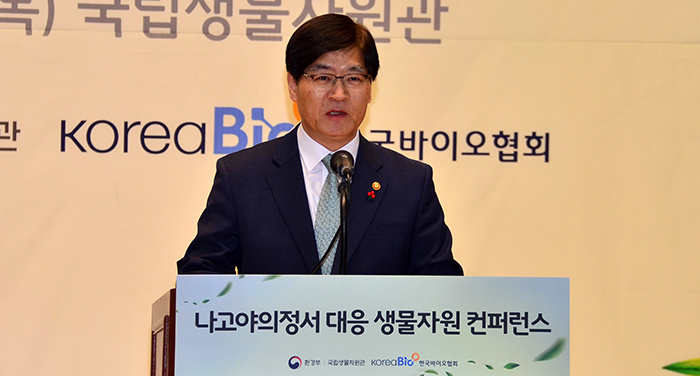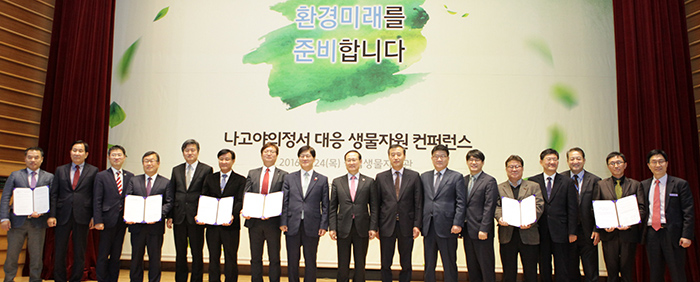-
 Korea.net's 24-hour YouTube channel
Korea.net's 24-hour YouTube channel- NEWS FOCUS
- ABOUT KOREA
- EVENTS
- RESOURCES
- GOVERNMENT
- ABOUT US
The Ministry of Environment hosted the Conference on Biological Resources in Response to the Nagoya Protocol, at the National Institute of Biological Resources in Seo-gu District, Incheon, on Nov. 24, bringing together more than 300 experts from the biotechnology industries and academia. The Nagoya Protocol concerns access to genetic resources and the fair and equitable sharing of benefits from their utilization.

Participants delved deeper into “access to genetic resources and the fair and equitable sharing of benefits from their utilization.” They also held talks under the theme of “The Present and Future of Access to Genetic Resources & the Sharing of Benefits From Their Unification in the Age of Biological Diversity,” as well as discussed ways to respond to the protocol.
“This conference was a chance to get a proper understanding of the utilization and the values of biological resources, as the Nagoya Protocol is soon to be ratified,” said Minister of Environment Cho Kyeung-kyu. “Hopefully, this has allowed for sincere talks among experts and made them see that ratification of the Nagoya Protocol is not a crisis, but is a new opportunity,” the minister said.

The Nagoya Protocol was adopted on Oct. 29, 2010, at the 10th Conference of the Parties to the Convention on Biological Diversity, in Nagoya, Japan, with government officials from major parties, including Korea, the U.N., Brazil, China, India and Switzerland in attendance.
The accord requires that any nation that uses biological genetic resources available in other countries must give notification and attain permission in advance from the providers. The receiving nations are also required to share any benefits from their utilization, either financial or non-financial, according to the contracts mutually agreed upon in Nagoya.
By Sohn JiAe
Korea.net Staff Writer
Photos: Ministry of Environment
jiae5853@korea.kr

Minister of Environment Cho Kyeung-kyu speaks during the Conference on Biological Resources in Response to the Nagoya Protocol, in Incheon on Nov. 24.
Participants delved deeper into “access to genetic resources and the fair and equitable sharing of benefits from their utilization.” They also held talks under the theme of “The Present and Future of Access to Genetic Resources & the Sharing of Benefits From Their Unification in the Age of Biological Diversity,” as well as discussed ways to respond to the protocol.
“This conference was a chance to get a proper understanding of the utilization and the values of biological resources, as the Nagoya Protocol is soon to be ratified,” said Minister of Environment Cho Kyeung-kyu. “Hopefully, this has allowed for sincere talks among experts and made them see that ratification of the Nagoya Protocol is not a crisis, but is a new opportunity,” the minister said.

Participants in the Conference on Biological Resources in Response to the Nagoya Protocol pose for a commemorative photo, in Incheon on Nov. 24.
The Nagoya Protocol was adopted on Oct. 29, 2010, at the 10th Conference of the Parties to the Convention on Biological Diversity, in Nagoya, Japan, with government officials from major parties, including Korea, the U.N., Brazil, China, India and Switzerland in attendance.
The accord requires that any nation that uses biological genetic resources available in other countries must give notification and attain permission in advance from the providers. The receiving nations are also required to share any benefits from their utilization, either financial or non-financial, according to the contracts mutually agreed upon in Nagoya.
By Sohn JiAe
Korea.net Staff Writer
Photos: Ministry of Environment
jiae5853@korea.kr
Most popular
- China warmly welcomes first Korea-born giant panda Fu Bao
- First hearing-impaired K-pop act hopes for 'barrier-free world'
- Novelist Hwang's 'Mater 2-10' shortlisted for Int'l Booker Prize
- Expats could account for 7% of population in 20 years: report
- Nat'l Fire Agency picks 137 elite staff for deployment abroad













